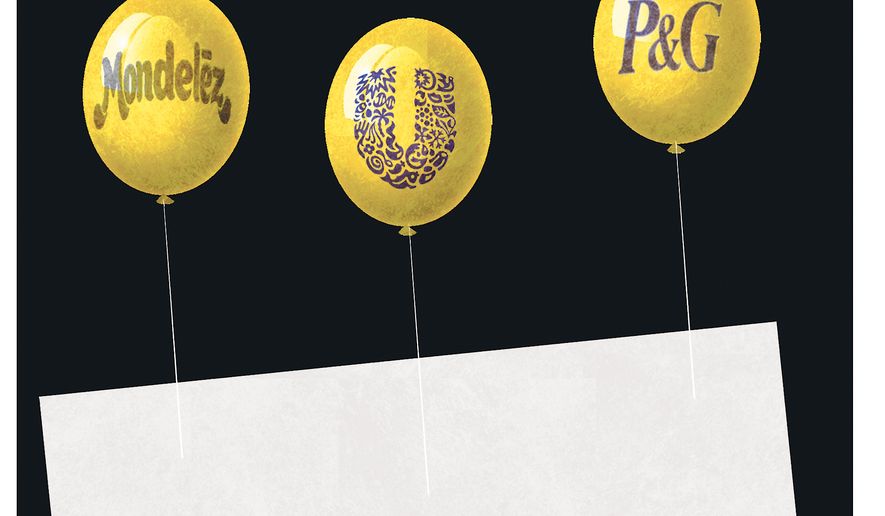OPINION:
A version of this story appeared in the daily Threat Status newsletter from The Washington Times. Click here to receive Threat Status delivered directly to your inbox each weekday.
It has been over two years since Russia invaded Ukraine, yet many well-known international brands, despite global condemnation and strict multilateral sanctions, continue to cling to the Russian market.
The initial response to the invasion from the West was swift and comprehensive. Over 1,000 major companies pulled out of the country despite the unavoidable costs of doing so and the application of sanctions packages aimed at secluding the country even further. The intent was clear — isolate Russia and cut off all dealings with the state while it wages war on its neighbor.
Still, there are those that continue to ignore the call to withdraw, citing justifications that are vaguely attributed to their obligation to supply essential items or fulfill other social responsibilities. They act seemingly unaware of the stark contradiction of this stance with their complicity in military aggression and human rights violations enacted by supporting the state with tax revenue and the economic activity they generate.
As American citizens, our taxes help Ukraine defend itself. At the same time, companies such as Unilever, Mondelez, and Procter & Gamble are working against us and undoing this contribution by paying taxes in Russia and possibly even sending their employees to fight against Ukraine.
How can this contradiction stand?
P&G‘s stubborn presence in Russia is particularly concerning because of its inclusion in a number of significant environmental, social and governance mutual funds. By staying in the Russian market, they contradict the social responsibility principles such investment vehicles are supposed to represent.
Not only are there concerns for shareholders, but companies are also failing in their duty of care toward their employees.
Recently introduced law in Russia now identifies company staff as state resources and, therefore, liable to be called up in successive mobilizations, which all companies in the country are obliged to play a part in facilitating. Is it a responsible business practice to allow employees to be pulled into a war they want no part in? What is there to say about a company that chooses to risk the lives of its staff and jeopardize those of innocents when the option to leave Russia is on the table?
I contacted P&G requesting a comment on why it had not yet completely left Russia. Despite being given the opportunity to clarify how the company would protect its employees if required to participate in the mobilization process, I received no response.
Public opinion is overwhelmingly against supporting those that enable aggressors. When asked if they would buy from companies that continue to operate in Russia, 88% of U.S. consumers said no, they would not.
As more American consumers turn away from companies with links to Russia and awareness grows through boycotts and other consumer action, any brands who continue to cling to the Russian market could see their reputations struck a blow.
With such clear reasons to turn their back on Russia, why do these companies persist? While an obvious case can be made for the lost revenue it would incur, those that have already left did take a financial hit, as expected, but soon bounced back.
The answer could be opportunism. Western companies rushed to enter the former Soviet Union in the early 1990s to claim their piece of the newly open market. Now, with other Western companies leaving Russia apace, the businesses that remain in the country see this exodus of the competition as a chance to increase their own market share by expanding into the gaps left behind.
The window to pull out is closing, as Russia makes it more difficult for companies to leave, further tightening laws as the clock ticks on. According to Bloomberg, a law introduced in December 2022 stipulates that any company seeking to withdraw from Russia must receive permission to do so from the state and, if granted, offer its local assets at a 50% discount. The terms will only become more severe as time passes.
Dollar figures cannot measure the human cost of war. Complicity in bloodshed and aggression cannot be rationalized by percentages. While it may seem prudent to sit on the fence, neutrality will always play into the hands of the oppressor. As the death toll of this war spirals, those who continue to hedge and delay withdrawing from Russia fully will find accountability reflected in their bottom line.
• Michael Podolsky is an American entrepreneur with Ukrainian origins, an expert in customer service and reputation management, and a proactive advocate of consumer rights and freedom of speech. He is CEO and co-founder of PissedConsumer.com.




Please read our comment policy before commenting.